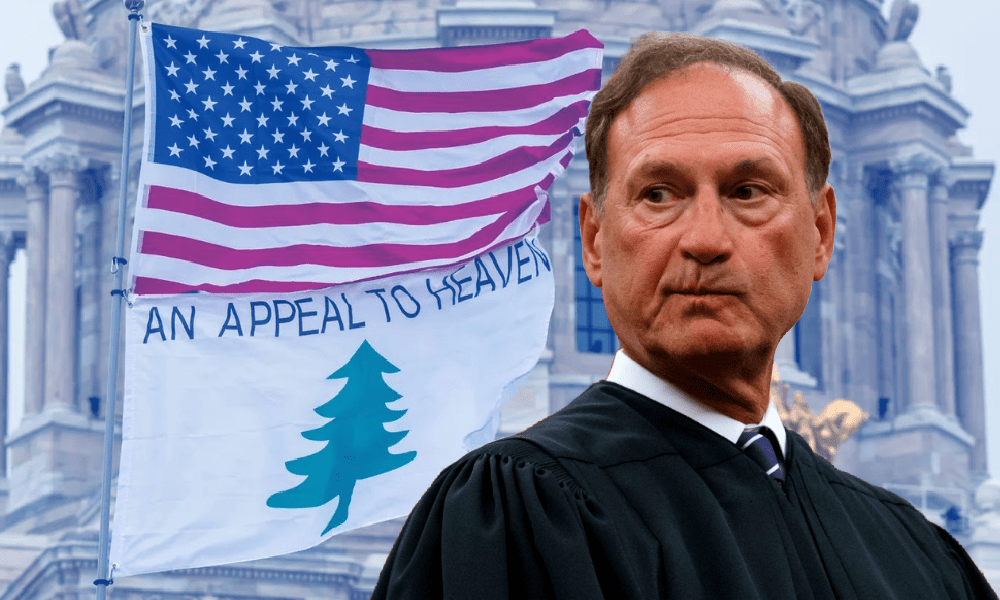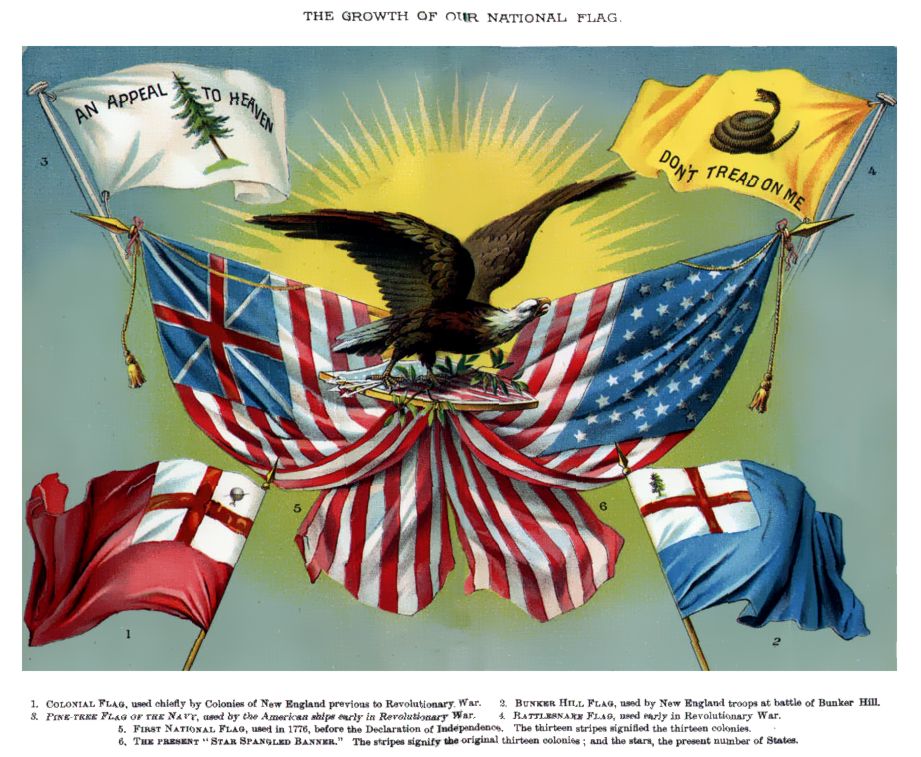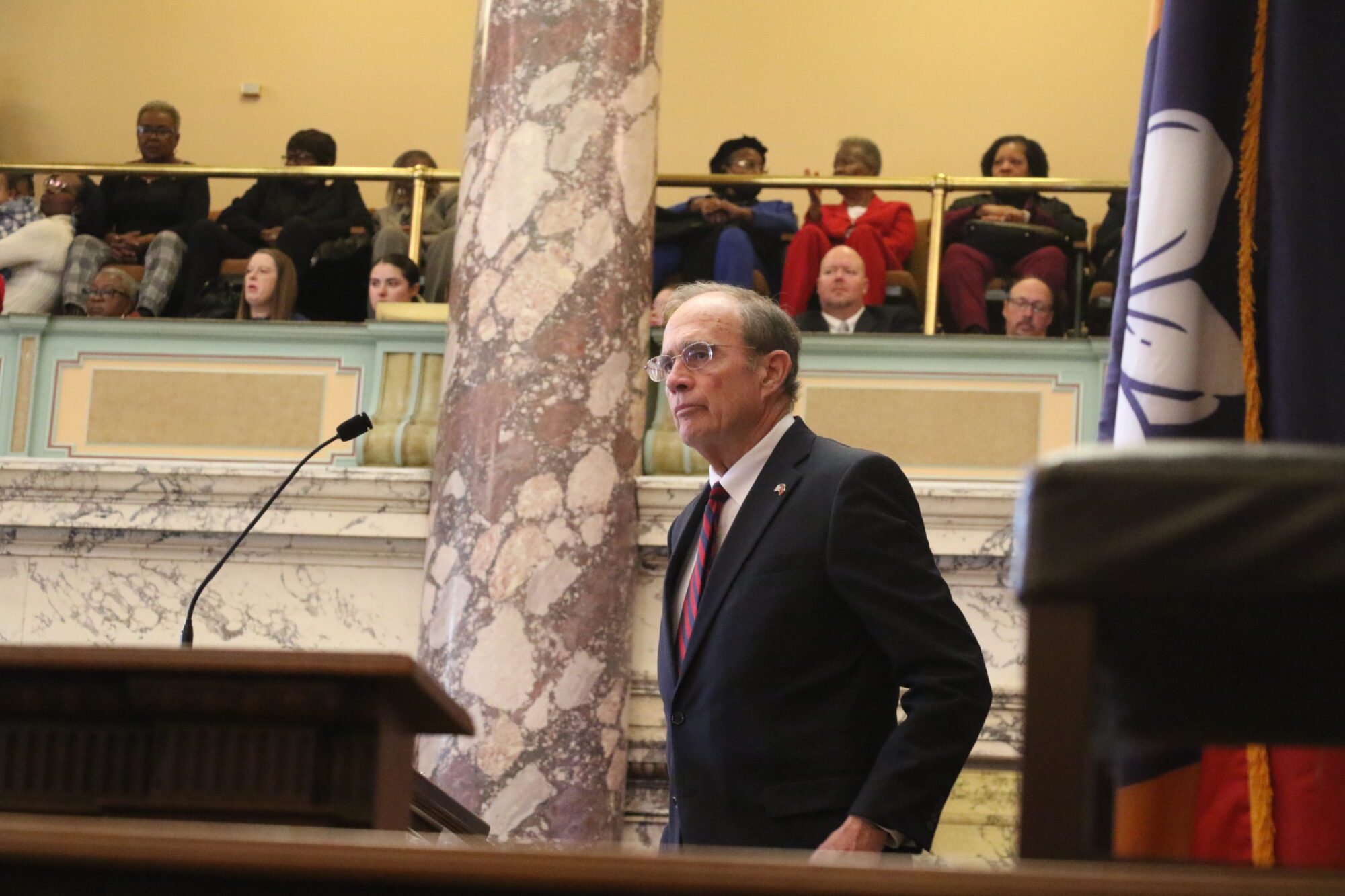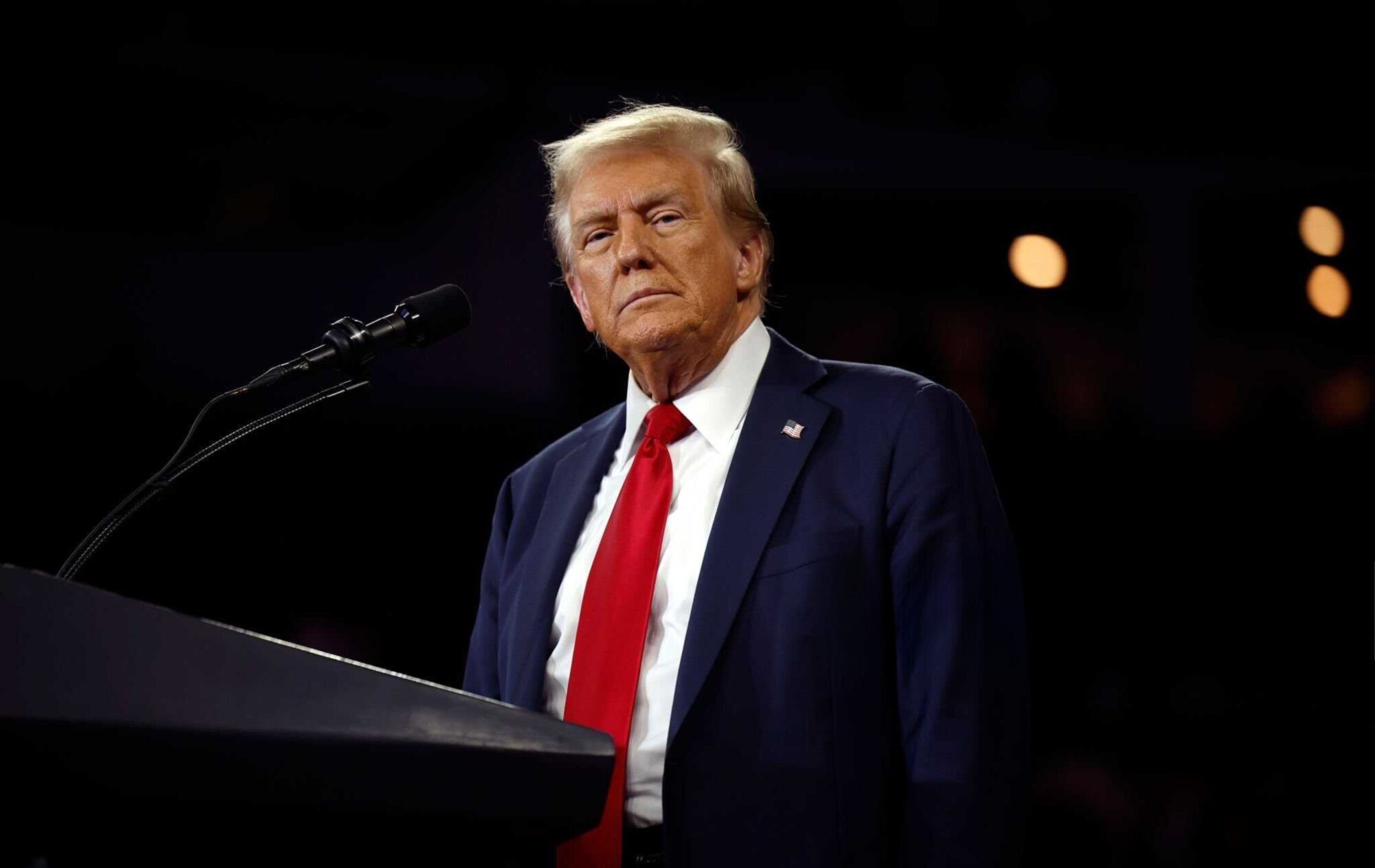
- Recent accusations against Supreme Court justices are unfounded — part of a deliberate effort to pack the Court and remove one of the last remaining checks on unfettered government power.
U.S. Supreme Court Justice Samuel Alito has come under intense scrutiny in recent weeks, first for two flags flown by Alito’s wife, and this week, for a covertly taped conversation in which Alito agreed with a provocateur that a return to godliness in America would be a good thing. (Shocked face!)
Both controversies are manufactured, part of an ongoing and deliberate attack on the High Court, itself. The strategy is clear — politicize and erode public trust in the Supreme Court, pack the Court with new justices, and destroy one of the last remaining checks on unfettered government power.
If the public sees judges as ‘politicians in robes,’ its confidence in the courts, and in the rule of law itself, can only diminish, diminishing the Court’s power, including its power to act as a ‘check’ on the other branches.
Former U.S. Supreme Court Justice Stephen Breyer
Character assassination of justices is simply part of the chess game. Complicit media came first for Justice Clarence Thomas, focusing on his decades-long friendship with a wealthy conservative, Harlan Crow. Thomas did nothing wrong. Nothing. His friendship with Crow violates no ethics’ rule, but that has not stopped the steady drumbeat against him.
Now, sights are trained on Alito — the author of the Dobbs decision that overturned Roe v. Wade and gave back to the states the right to democratically determine their own policies on abortion. Efforts are underway to paint him as an insurrectionist, white supremacist, or Christian nationalist. None of the characterizations are true; all of them besmirch the reputation of a gifted legal mind and jurist. That does not matter to his attackers. He’s a pawn.
Red Flags?
In the aftermath of January 6th events in 2021, Alito’s wife flew an upside down American flag at their home. The upside down flag historically means “a nation in distress.” There were certainly people on both sides of the riots at the Capitol — Trump acolytes and Trump detractors — who believed our nation to be in distress at that time.
But Mrs. Alito’s explanation was not that high-minded. She’d been the victim of neighborhood bullying and the flag was an act of defiance on her part. Justice Alito has indicated he asked Mrs. Alito to remove the flag, but she declined for several days.
It turns out Martha-Ann Alito has her own thoughts — political and otherwise — and expresses them whether Samuel Alito likes it or not. It’s 2024. Women are allowed to think for themselves.
As for the “Pine Tree Flag,” also known as the “Appeal to Heaven Flag,” Mrs. Alito flew it outside of the couples New Jersey beach home during the summer of 2023. Critics now say its a symbol of white supremacy and Christian nationalism.
But the pine tree has long been a symbol of liberty in New England. Colonists adopted flags and currency featuring the tree as early as the 17th Century. In 1775, Colonel Joseph Reed, secretary to General George Washington, commissioned the design of the Pine Tree Flag, which would go on to fly on American naval vessels during the Revolutionary War.

The phrase “Appeal to Heaven” came from the writing of British philospher John Locke, who in 1690 published his Second Treatise on Government. Locke wrote, “And where the body of the people, or any single man, is deprived of their right, or is under the exercise of a power without right, and have no appeal on earth, then they have a liberty to appeal to heaven, whenever they judge the cause of sufficient moment.”
Because of its origin and message, adherents to the principles of our nation’s founding have always held the Pine Tree Flag in high regard. Indeed, even outside of “conservative” circles, the flag had been revered.
It flew, for instance, in front of the San Francisco City Hall from 1964 until a couple of weeks ago. Apparently the leaders of arguably the most progressive city in the United States had not been made aware of the symbol’s newly found white supremacy and Christian nationalism until after the flag was weaponized against Alito. They hurriedly came into compliance with the new narrative, erasing a six-decade link to the flag.
In short, this flag mess is bunk.
Godliness, a bad thing?
This brings us to the second round of attacks. For two years running, Lauren Windsor, described by Rolling Stone as “a liberal documentary filmmaker,” attended the Supreme Court Historical Society Dinner to secretly tape Justice Alito, his wife, and Chief Justice John Roberts.
Windsor presented herself as a religious conservative and attempted to goad the justices into inflammatory remarks. She came up short. That did not stop Rolling Stone — that paragon of virtuous reporting — from extraordinary contortions of what Alito said:
“The justice’s unguarded comments highlight the degree to which Alito makes little effort to present himself as a neutral umpire calling judicial balls and strikes, but rather as a partisan member of a hard-right judicial faction that’s empowered to make life-altering decisions for every American.”
Only Alito did not engage in partisanship during the conversation, and to the extent he offered opinions, they were qualified with a recognition of the limited role and ability of the Supreme Court to address the issues Windsor raised to him.
In the recording, Windsor speaks to Alito about “the polarization in the country” and suggests that perhaps negotiations with the “left” cannot happen and “that it’s a matter of, like, winning.”
Alito responded, “I think you’re probably right. On one side or the other — one side or the other is going to win. I don’t know. I mean, there can be a way of working — a way of living together peacefully, but it’s difficult, you know, because there are differences on fundamental things that really can’t be compromised. They really can’t be compromised. So it’s not like you are going to split the difference.”
Alito made an altogether logical, non-controversial observation. When two diametrically opposed sides square off, one will win. But you also see in the statement a desire on the part of Alito for people of different beliefs to find ways to live and work together.
Windsor’s second attempt to catch Alito came through religion, “I think that the solution really is like winning the moral argument. Like, people in this country who believe in God have got to keep fighting for that — to return our country to a place of godliness.”
Alito responded, “I agree with you. I agree with you.”
It’s worth noting that this is a conversation at a dinner party, where people tend to be polite to one another. If I had to count the number of times I have said “yeah,” “sure,” or “that makes sense,” while not listening at dinner parties, it would take me longer than it will take you to read one of my articles, which is to say a while.
But let’s say Alito was actually engaged and actually agrees with Windsor. So what? I too think that moral arguments have to be won. If you think something is immoral, it is immoral not to confront it. I too think that it would be good if our country returned to a place of godliness, and am candidly baffled as to when that thought process became so taboo.
Heaven forbid we treat each other with the love, kindness, and grace Christians are called to embrace. Heaven forbid husbands and wives honor each other with fidelity. Heaven forbid we conduct business between one another with honesty and integrity.
More importantly, though, any desire on part of Alito to return to a place of godliness should not be conflated with a desire to impose Christianity through the force of government, or through his seat on the Court. Nothing in Alito’s response suggests he wants to use the Court to do so. In fact, he explicitly told Windsor that the Court lacked that power when pressed.
The mere public expression of Christian thoughts is not Christian nationalism. Christians are not required to hide what they believe. The use of the freedom of religious expression is not proof of authoritarianism.
The gross proliferation of the “Christian nationalist” label occurring in the public square of late rings as hollow as the affixing of labels like “racist” and “white supremacist” to literally everything the far left finds disagreement in.
That’s not to say there aren’t Christian nationalists, racists, or white supremacists in America, just that the weaponization of those terms presents a “boy who cried wolf” problem. Alito is none of the things he is being called. Nothing in his personal or professional life warrants the slander he is facing.
The Diabolical, Dishonest Design
The U.S. Supreme Court is arguably the only branch of the federal government remotely close to serving its constitutional role. It’s certainly the only branch that shows any concern for limiting the size and scope of government consistent with the Constitution.
This makes the Court the enemy of people whose view of government is “bigger is better.” Legitimate efforts have been made in recent years, with proposals in both bodies of Congress, to expand the size of the Supreme Court to up to thirteen justices from its current tally of nine.
The effect of such a move would be to gut the independence of the judiciary and destroy the separation of powers that is a hallmark of our constitutional system.
If anything would make the court look partisan, it would be that — one side saying, ‘When we’re in power, we’re going to enlarge the number of judges, so we would have more people who would vote the way we want them to.’
Former U.S. Supreme Court Justice Ruth Bader Ginsburg
The Supreme Court is also the only branch of government that is not overtly partisan or ideological. Despite frequent narratives about the ‘conservative bloc’ and the ‘liberal bloc’ of the Court, there are far more 9-0 decisions made by the Supreme Court than 5-4 or 6-3 decisions.
And justices frequently rule against the political party of the president who appointed them, and against their own likely policy preferences — recognizing their role is not to aid in elections or make law, but to assess the constitutionality of law.
Yesterday’s 9-0 ruling on the so-called “abortion pill” is a prime example. There are six Catholics on the U.S. Supreme Court. Catholic doctrine strongly opposes abortion, and there are veins of Catholicism that even oppose birth control.
But all six of the Catholics on the Court voted against restrictions on mifepristone because the petitioner lacked standing to bring the suit. The law required the decision, even if it meant more abortions occur in the U.S. in contravention of Catholic doctrine.
Early this year, three justices appointed by Democrats sided with Republican appointees to rule that Donald Trump could not be kept off the ballot in Colorado. It was the correct legal holding, even if Justices Sotomayor, Kagan, and Jackson prefer Biden over Trump. Before that, in the lead up to Joe Biden’s inauguration as president, the U.S. Supreme Court — featuring three justices appointed by Donald Trump — twice denied lawsuits seeking to overturn the election in Trump’s favor.
Unlike Congress, with its single-digit approval ratings, or an executive branch that openly flauts the rule of law and separation of powers, the Supreme Court works.
Chief Justice Roberts is right to tell Congress to go pound sand after being recently summoned to defend the Court. The Supreme Court is a co-equal branch of government that does not answer to Congress. Congress is a dysfunctional branch of government that would rather put on absurd political theater over a flag than to, as an example, deal with the fact that there’s a sitting U.S. Senator, Robert Menendez (D-NJ), currently facing federal bribery charges.
These efforts to undermine the institution of the Court and the rule of law should be rightly rejected, lest we lose the last functioning branch of government.











